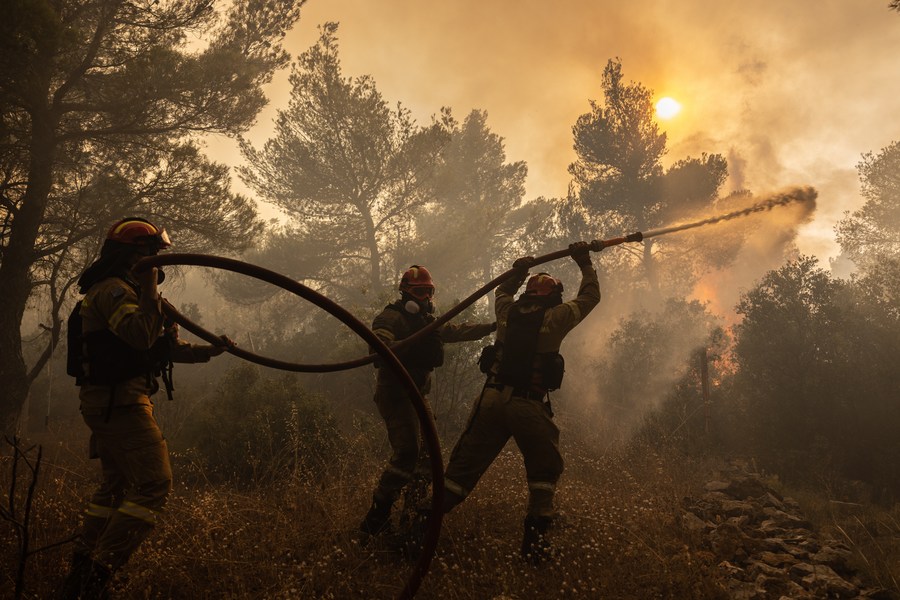
This aerial photo taken on Oct. 30, 2023 shows the site of Cox's Bazar wind power project in Bangladesh. Khurushkul, once a small village in Bangladesh's Cox's Bazar district, some 400 km southeast of the capital Dhaka, boasts Bangladesh's first wind power plant built by a Chinese company.(Photo by Salim/Xinhua)
COP28 will be a milestone moment as it will respond to the first-ever Global Stocktake of the Paris Agreement.
DUBAI, Nov. 29 (Xinhua) -- More than 70,000 delegates from around the globe will gather here in the next two weeks for COP28, the United Nations (UN) conference tasked with addressing one of the most pressing challenges facing planet Earth, namely climate change.
Here are some key facts about COP28 and why it is of critical importance for humanity.
WHAT IS COP28?
COP28 stands for the 28th meeting of the Conference of the Parties (COP) to the United Nations Framework Convention on Climate Change (UNFCCC).
In the three decades since the Rio Summit and the launch of the UNFCCC, the conference of the parties has convened every year to determine ambitions and responsibilities related to climate change, as well as assess climate measures.
The previous session, COP27, was held in Sharm El-Sheikh, Egypt. An agreement to establish a "loss and damage" fund then was hailed as a major breakthrough.
COP21 in 2015 led to the Paris Agreement, the landmark climate treaty that mobilizes collective action to limit global temperature increase to 1.5 degrees Celcius above pre-industrial levels.
The upcoming event in Dubai, United Arab Emirates (UAE), will last from Nov. 30 to Dec. 12 as leaders from governments, businesses and civil societies meet to seek concrete solutions to climate change.

Firefighters battle a wildfire in Agia Sotira, a western suburb of Athens, Greece, on July 20, 2023. For the fourth consecutive day, the wildfires continue to ravage houses and forests in the western part of Athens. (Photo by Lefteris Partsalis/Xinhua)
WHY IS IT IMPORTANT?
Climate disasters across the world this year have warned us once again of the urgency to address climate change.
In July, the world's hottest month on record, UN Secretary-General Antonio Guterres warned that the era of global warming has ended and "the era of global boiling has arrived."
COP28 will be a milestone moment as it will respond to the first-ever Global Stocktake of the Paris Agreement.
As a mechanism created under the Paris Agreement, the Global Stocktake requires that countries assess their climate measures every five years. The outcome provides input for new nationally determined contributions of parties.
Reports on the stocktake so far have shown that while the Paris Agreement has spurred action on climate change, current policies and promises to cut greenhouse gas emissions are not sufficient.
As delegates in the UAE will assess how far off track they are from meeting the promises to stop global warming, COP28 is expected to be a pivotal opportunity to correct course and accelerate action.
THEMATIC PROGRAMS
Dubai is hosting COP28 in its Expo City, and there are two main sites for the events -- the Blue Zone and the Green Zone.
The UN-managed Blue Zone is open to accredited delegates and it hosts formal negotiations as well as the World Climate Action Summit and country pavilions.
The Green Zone managed by the COP28 UAE Presidency offers a platform to non-accredited delegates from youth groups, NGOs, the private sector and indigenous groups to have their voices heard.
Scheduled thematic programs cover key climate-related issues including fast-tracking a just, orderly and equitable energy transition and delivering funds for climate action.
Events that focus on putting nature, lives and livelihoods at the center of climate action and mobilizing for the most inclusive COP are also on the agenda.

This aerial photo taken on Nov. 16, 2023 shows the Dingdongpo wind power-photovoltaic project in Shiqian County of Tongren City, southwest China's Guizhou Province. (Xinhua/Yang Wenbin)
STICKING POINTS
It is hoped that COP28 will help keep alive the goal of limiting long-term global temperature rise to 1.5 degrees Celcius, as was agreed in the Paris Agreement.
Achieving this goal depends largely on an effective transitioning from fossil fuels to clean energy sources.
However, countries remain divided over how to tackle the unsustainable use of fossil fuels and the pace of shifting to green energy sources will be a hot topic for discussion and negotiation.
In the meantime, while the need to provide financial assistance to nations most vulnerable to and most impacted by the effects of climate change has been agreed upon, the fulfillment of financial commitments remains incomplete.
At COP28, climate finance and the transfer of "loss and damage" funds will likely be another thorny issue.




 A single purchase
A single purchase









